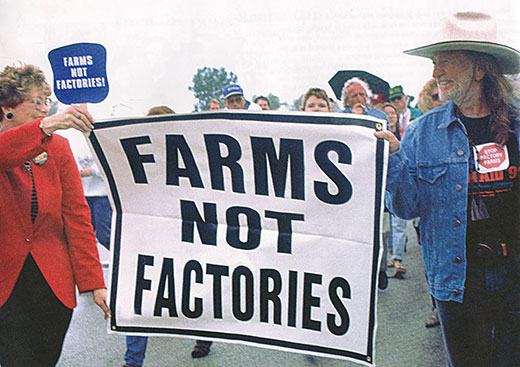BY BILL KNIGHT
Karen Hudson has had brushes with fame – and the law – but days after the 20th anniversary of her increased involvement with sustainable agriculture, the 61-year-old Peoria County resident stresses that she’s an everyday person and most enjoys talking to regular people – and listening.
“I’m willing to stand up and talk, talk from the heart,” she says, shrugging. “People just want to live our lives. I try to teach them and let people decide how to move forward.“

Karen Hudson works at her desk in her rural Peoria County home. After two years of legal haggling, a contempt of court charge against Hudson was summarily reversed by the Fourth District Appellate Court. The charges against Hudson stemmed from allegations by representatives of a CAFO that was in court over nuisance complaints. The contempt of court charge against Hudson was then used as justification to declare a mistrial.
Now a regional representative from the Socially Responsible Agricultural Project (SRAP), a national organization based in Salem, Ore., with such “public educators” in 13 states and outreach in all 50, Hudson is an Illinois State University graduate whose family still runs a fifth-generation, 1,200-acre farm in Peoria County. She says she’s not an advocate as much as an educator, drawing on her food and nutrition background at ISU.
“Resisting needs learning,” she says. “Organizing needs teaching.”
People typically want ideas on resisting concentrated animal feeding operations (CAFOs), often called “factory farms,” which raise thousands of animals in small areas, often resulting in noxious smells, tainted water, a lack of consequences for polluters, dangers of nutrient-overloading with manure, and lax enforcement.
The massive amounts of manure produced are stored in holding ponds or underground and later sprayed into the air as fertilizer. Their huge trucks can damage rural roads; runoffs or leaks cause catastrophic damage to streams and wells; stink, pathogens and the rest diminish property values.
Illinois has more than 3,500 CAFOs, according to estimates from the state Environmental Protection Agency (EPA), which is supposed to handle environmental enforcement for the Illinois Department of Agriculture, which in turn approves construction under Illinois’ Livestock Management Facilities Act (LMFA –“It’s more like ‘Leave My Factory Alone,” Hudson says). However, there are too few inspectors (Illinois inspects about 200 CAFOs annually). The EPA doesn’t know the exact number of CAFOs, their locations or operations, and there’s little self-reporting required by law.
The struggle has gained considerable attention and allies, from the Sierra Club to former Republican State Rep. Judy Koehler:
* Legendary musician Willie Nelson joined Hudson on a picket line at a Farm Aid event, protesting factory farms.
* The late journalist Bernie Gavzer, who’d covered stories ranging from JFK’s assassination to medical marijuana for the Associated Press, NBC News, and other outlets, in 2001 spent the day with Hudson preparing a Parade magazine feature on Hudson’s efforts, a story killed when the 9/11 terror attacks occurred.
* Hudson is one of three people profiled in the 2010 book “Animal Factory” by New York Times bestselling author David Kirby (“Death at SeaWorld”), and the next year she delivered a TED talk in Manhattan: “The Hidden Price Tag of Industrial Agriculture.”
* Australian screenwriter Shaun Grant visited Hudson for two days while preparing a script for film producer Emile Sherman (“Lion,” “The King’s Speech”) on a recently funded movie project. Tentatively titled “A Man with No Enemies,” Sherman described it as a “thriller set in the complex world of the factory farming industry.”
* Most recently, Hudson was recorded for an oral history project on agriculture housed in the Abraham Lincoln Presidential Library and Museum.
Apart from such respect, she gained some notoriety that was corrected on Dec. 7, when an Illinois Appeals Court swiftly reversed a two-year-old contempt of court charge stemming from her presence at a Scott County, Ill., courtroom where 10 neighbors had filed a nuisance suit against a CAFO with 15,000 animals producing considerable odors and flies.
There, inside the stately courthouse on Market Street in Winchester, Circuit Judge David Cherry returned from lunch and said someone had told him that Hudson had given a book to two people in the gallery, and he called her before him and said, “You are here to influence a jury. That is jury tampering. That is a felony.”

Karen Hudson marches with Willie Nelson at Farm Aid 2005 in Tinley Park, Ill.
Although conceding neither he nor the bailiff saw Hudson give out the books, Cherry had her handcuffed, jailed and fined $500.
Two months after that April 2014 incident, Hudson filed an objection; Cherry conducted a hearing that September; and he received a supplementary motion four months later. He denied the objection 14 months later.
But in December, within minutes of the argument by her lawyer, Kevin Sullivan of Peoria, Appellate Court Judges Lisa Holder-White, M. Carol Pope and James Knecht unanimously vacated the charge, explaining that Hudson was denied “procedural safeguards” such as an opportunity to answer the accusation and the rights to confront and question witnesses and be proved guilty beyond a reasonable doubt.
Cherry’s proceeding was less a “hearing and more of a lecture by the court,” the Appellate Court said.
Hudson has mixed feelings about that ordeal.
“It has been a lengthy, but empowering experience for us to persevere and eventually prevail in this gross miscarriage of justice,” she said. “[But] sometimes I wonder why I’m doing this.”
Then she remembers successful citizen efforts to block CAFOs in Fulton, Jo Davies, Marshall, McDonough, Sangamon and other Illinois counties, and she beams at the memory of hundreds of everyday people turning out in Pleasant Hill, in Pike County, for a five-hour meeting in 90-degree weather to organize.
“Someone showed us a memo from a Big Ag lobby who said we were ‘winning the PR battle,’ which was the best thing we’d heard,” she says.
Like most teachers, Hudson has “lesson plans,” tools she uses to inform those interested in the issue, from lawmakers to ordinary folks who don’t want the problem. Her advice is to define specific objectives; network with neighbors and encourage public participation; gather facts – concentrating on peer-reviewed research and engineers’ judgment; engage with anyone affected, including schools and local governments; “be firm and polite;” and “always operate within the boundaries of the law.”
She adds that people “have to be organized and disciplined.”
“We show people the process – how the applications are supposed to work, the protocol, the permitting – and they throw everything they can at CAFOs, from improper setback distances to incorrect or slipshod applications,” she says.
Big Ag has all the money and influence, she says. People standing against them do it all on their own time. But perseverance sometimes prevails with preparation and knowledge.
“It’s an old saying, but it’s true: ‘Give someone a fish, and you feed them for a day. Teach them to fish, and you feed them for a lifetime.’”

3 comments for “Protesting factory farms ”
Recent Comments
Very informative read. Thank you.
Well done Karen! 😉👍 You’ve been at it a long time.
I APPLAUDE HER EFFORTS. By the way, I have a degree in Agribusiness.